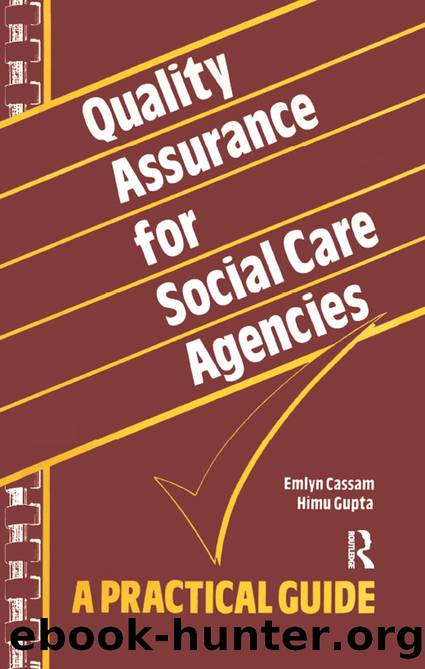Quality Assurance for Social Care Agencies: A Practical Guide by Emlyn Cassam

Author:Emlyn Cassam [Cassam, Emlyn]
Language: eng
Format: epub
Tags: Public Policy, Social Services & Welfare, Social Science, Political Science, Social Work
ISBN: 9780582089440
Google: LTg7DwAAQBAJ
Goodreads: 2507438
Publisher: Routledge
Published: 1990-09-24T00:00:00+00:00
This workload management system emphasises the value of regular diarying/monitoring of how time is actually spent, and faces up to shortfalls in resources. It also ensures that quality standards are defined, and tries to evaluate the effectiveness and cost of various types of intervention. There is, in fact, something for everyone, service user, member of staff, manager and councillor. At the very least, it makes sure that decisions on which work is to be done and which can be left, are taken by councillors and managers, not by overstressed front line workers.
The analysis of the time and skills required to do certain tasks has another advantage â it can identify areas of activity which do not require the skills of the most experienced and qualified staff. These can be transferred to other staff without formal qualifications.
For example, one of Norfolkâs early inspections was into the work being done by social workers approved under the Mental Health Act. We found that the vast majority of their time was being spent on problems relating to accommodation, welfare rights, employment and general advice on coping with day-to-day living. All these activities had been passed to the mental health worker because this was âa mental health caseâ. We have no doubt that similar results would be found if a survey were done into the tasks of social workers dealing with children. Even accepting that a large part of childcare is dynamic enough to warrant an experienced and trained worker, there are still tasks and monitoring that can be carried out effectively by others under supervision. At a time when it is not uncommon for local authorities to have a vacancy rate for social workers of up to 15 per cent, it makes little sense not to analyse what only they can do, and to appoint others to make inroads into the rest. Vacancies and waiting lists do not deliver very good services!
To return to one of the inhibitions feared by some managers, namely that a workload management system would pass too much control to the staff. It can be seen from the above paragraphs that this would not be so. Decisions on standards and priorities will be left firmly with management and councillors. And of the quantity of work done? More work will be obtained from a workforce that is motivated to carry out achievable tasks than one demoralised through stress and overwork.
To complement a workload management system, management should also tell staff what they are to do if finance or other resources are not sufficient to deliver the service which has been assessed. Take the home-care service for example. Few Departments would be able to meet all requests for assistance within a cash-limited budget. To leave all decisions to the Home-Care Manager smacks more of abrogation of responsibility than delegation.
Or what of the Occupational Therapy Service? Again, a cash-limited budget with almost unending demands. Is the agency in the business of providing mugs, cutlery and bath mats which can easily be bought at the local store? That is not a decision for the occupational therapist, but the councillor.
Download
This site does not store any files on its server. We only index and link to content provided by other sites. Please contact the content providers to delete copyright contents if any and email us, we'll remove relevant links or contents immediately.
The Secret History by Donna Tartt(19088)
The Social Justice Warrior Handbook by Lisa De Pasquale(12190)
Thirteen Reasons Why by Jay Asher(8909)
This Is How You Lose Her by Junot Diaz(6886)
Weapons of Math Destruction by Cathy O'Neil(6279)
Zero to One by Peter Thiel(5801)
Beartown by Fredrik Backman(5754)
The Myth of the Strong Leader by Archie Brown(5507)
The Fire Next Time by James Baldwin(5444)
How Democracies Die by Steven Levitsky & Daniel Ziblatt(5218)
Promise Me, Dad by Joe Biden(5153)
Stone's Rules by Roger Stone(5087)
A Higher Loyalty: Truth, Lies, and Leadership by James Comey(4963)
100 Deadly Skills by Clint Emerson(4925)
Rise and Kill First by Ronen Bergman(4788)
Secrecy World by Jake Bernstein(4753)
The David Icke Guide to the Global Conspiracy (and how to end it) by David Icke(4718)
The Farm by Tom Rob Smith(4509)
The Doomsday Machine by Daniel Ellsberg(4490)
